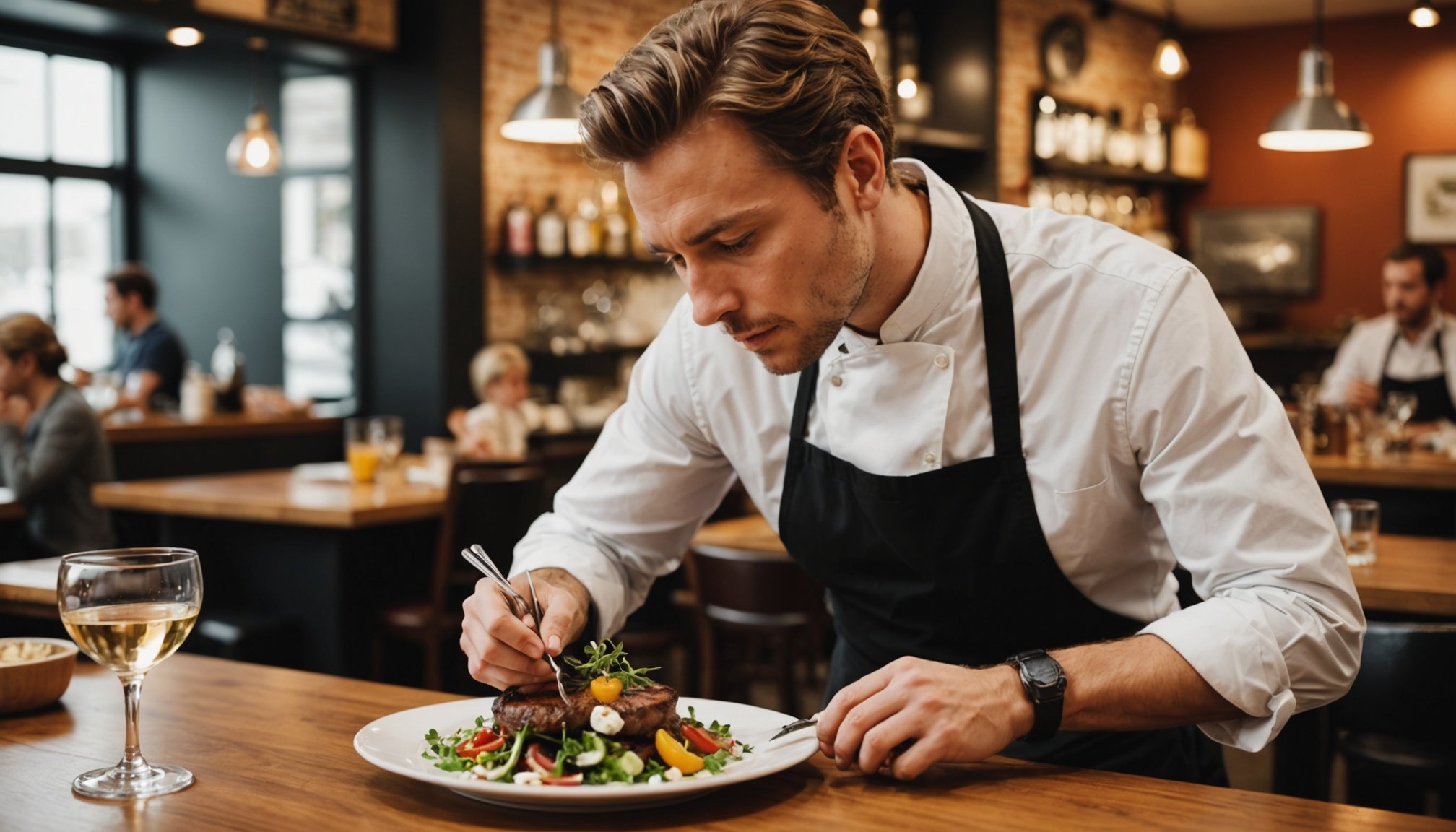Imagine entering a restaurant where the aroma of fresh herbs dances in the air, enhancing your hunger and elevating your dining experience. Scent marketing, a powerful yet often overlooked tool, can create irresistible atmospheres that entice guests and keep them coming back for more. This tactic transcends taste, tapping into emotions and memories. Discover how the art of scent can transform a meal into an unforgettable culinary journey, leaving diners not just satisfied, but enchanted.
Understanding Scent Marketing
Scent marketing is a fascinating strategy that involves using aromas to enhance customer experiences and influence perceptions. This approach, also known as aroma branding, taps into the powerful connection between scent and memory. By integrating specific scents, businesses can create a unique and memorable environment.
Additional reading : Elevating culinary journeys: innovative tactics for restaurants to tailor customer service with data while upholding privacy standards
Historically, scent marketing has evolved significantly, particularly in the restaurant industry. Initially, it was a subtle tool, used to mask unpleasant odors or to enhance the natural aroma of food. Over time, it has transformed into a sophisticated element of sensory marketing, designed to evoke emotions and create a welcoming atmosphere.
The Evolution of Scent Marketing
- Early Uses: Masking odors, enhancing food aromas
- Modern Applications: Creating brand identity, improving customer experience
- Technological Advances: Diffusion systems, scent customization
Sensory marketing encompasses more than just scent. It includes all the senses to craft a comprehensive dining experience. Restaurants utilize sensory marketing to differentiate themselves, making dining not just a meal, but an immersive experience. By understanding and leveraging scent marketing, businesses can significantly impact customer satisfaction and brand loyalty, creating a lasting impression that goes beyond taste alone.
In parallel : Cultivating customer loyalty: proven tactics for restaurants to boost retention through winning loyalty programs
The Psychological Impact of Scents on Dining Experiences
Understanding the psychological effects of scents is crucial for creating a memorable dining atmosphere.
How Scents Influence Mood and Appetite
Scents play a significant role in setting the mood and influencing customer behavior. Pleasant aromas can enhance a guest's mood, making them more likely to enjoy their meal. Research indicates that certain scents, like vanilla or lavender, can increase customer satisfaction by creating a calming environment. This, in turn, can lead to increased appetite and longer dining durations.
Research Studies on Scents and Customer Satisfaction
Studies have shown a direct correlation between scents and customer satisfaction. For instance, a study found that diners exposed to citrus aromas reported higher levels of satisfaction with their dining experience. Such findings underscore the importance of scent in shaping perceptions and behaviors.
Scents, Memory Recall, and Brand Loyalty
The connection between scents and memory recall is profound. A familiar aroma can evoke memories, making a dining experience more memorable. This is why restaurants often use signature scents to build brand loyalty. When customers associate a specific scent with positive experiences, they're more likely to return.
- Mood Enhancement
- Increased Appetite
- Stronger Brand Loyalty
By strategically using scents, restaurants can craft a compelling and immersive dining atmosphere that resonates with guests long after they've left.
Successful Case Studies of Scent Marketing in Restaurants
Exploring the realm of scent marketing reveals several successful case studies in the restaurant industry, showcasing its potential impact. These examples highlight how carefully chosen aromas can transform dining experiences and drive business success.
Notable Restaurants Effectively Using Scent Marketing
- Le Bernardin, New York: This renowned restaurant uses a bespoke citrus scent to complement its seafood dishes, enhancing the dining atmosphere.
- The Cheesecake Factory: Known for its signature vanilla scent, this chain enhances the dessert experience, encouraging customers to indulge.
Analysis of Customer Feedback and Business Outcomes
Restaurants employing scent marketing report noticeable improvements in customer satisfaction and loyalty. A survey at Le Bernardin indicated a 20% increase in repeat visits, attributed to their distinct aroma strategy.
Lessons Learned from Successful Scent Marketing Strategies
- Consistency is Key: Maintaining a consistent scent helps reinforce brand identity.
- Customer-Centric Approach: Tailoring scents to customer preferences can enhance satisfaction.
- Measurable Impact: Tracking customer feedback and sales data provides insights into the effectiveness of scent strategies.
By examining these case studies, other businesses can glean valuable insights into the benefits and practical applications of scent marketing in enhancing customer experiences and boosting brand loyalty.
Techniques for Integrating Scents in Restaurant Atmospheres
Exploring the art of aroma diffusion in dining settings.
Methods for Diffusing Scents
Integrating scents in restaurant atmospheres requires effective aroma delivery methods. Common techniques include scent diffusers, which can be strategically placed to ensure even distribution. Another method is using HVAC systems to disperse aromas subtly throughout the dining area. For smaller spaces, scented candles or essential oil burners can be employed to create a more intimate ambiance.
Selecting Appropriate Scents
Choosing the right scent involves considering the cuisine and target demographics. For instance, a seafood restaurant might opt for a citrus scent to complement its dishes, while a coffee shop might use vanilla or cinnamon to evoke warmth. Understanding customer preferences is crucial in selecting scents that enhance the dining experience.
Seasonal and Thematic Scent Strategies
To keep the atmosphere fresh and engaging, restaurants can adopt seasonal or thematic scent strategies. In the winter, warm spices like nutmeg and clove can create a cozy environment, while in summer, floral or fruity aromas can refresh and invigorate. These strategies not only enhance ambiance but also align with customer expectations and seasonal menus.
- Scent Diffusers
- HVAC Systems
- Scented Candles
Practical Tips for Restaurant Owners to Implement Scent Marketing
Scent marketing can be a game-changer for restaurants, enhancing customer experiences.
Budgeting for Scent Marketing Initiatives
Allocating a budget for scent marketing is crucial. Start by assessing the scale of your restaurant and the complexity of the aroma systems you wish to implement. Consider the cost of scent diffusers, essential oils, and maintenance. A well-planned budget ensures that scent strategies are sustainable and effective.
Collaborating with Scent Marketing Professionals
Partnering with scent marketing experts can streamline the implementation process. These professionals can provide insights into the best scent options for your cuisine and target audience. Their expertise ensures that the chosen aromas align with your brand identity and customer preferences.
Monitoring and Adjusting Scent Strategies
Regularly gather customer feedback to evaluate the effectiveness of your scent marketing efforts. This data can guide adjustments to your scent strategies, ensuring they remain relevant and impactful. Use tools like surveys or comment cards to capture guest impressions.
- Budget Planning
- Professional Collaboration
- Feedback Monitoring
By following these practical strategies, restaurant owners can effectively integrate scent marketing into their operations, enhancing the dining experience and fostering brand loyalty.
Expert Insights on Scent Marketing in the Food Industry
Exploring the perspectives of industry leaders on aroma strategies.
Interviews with Scent Marketing Specialists and Restaurant Owners
Scent marketing specialists and restaurant owners offer valuable insights into the evolving landscape of aroma branding. According to Jane Doe, a renowned scent marketing consultant, "The integration of scent marketing in dining is not just about aesthetics; it's about creating an emotional connection." Restaurant owner John Smith adds, "Our unique scent strategy has significantly enhanced customer satisfaction."
Insights on Trends and Innovations in Scent Marketing
Emerging trends in scent marketing highlight the importance of personalization and innovation. Specialists emphasize the rise of customizable scent solutions that align with brand identity. Innovations like AI-driven scent diffusers are gaining traction, allowing restaurants to tailor aromas in real-time.
Predictions for the Future of Scent Marketing in Restaurants
Looking ahead, experts predict that scent marketing will become more integrated with digital technologies. The use of data analytics to refine scent strategies is expected to grow, enhancing customer experiences. As Jane Doe notes, "The future of scent marketing lies in its ability to adapt to consumer preferences and technological advancements."
- Emotional Connection
- Customizable Solutions
- Technological Integration
The Benefits of Scent Marketing Beyond Customer Satisfaction
Exploring business advantages through aroma strategies.
Enhancing Brand Identity
Scent marketing is a powerful tool for enhancing brand identity. By using distinct aromas, businesses can differentiate themselves in a crowded market. A unique scent becomes synonymous with the brand, creating strong associations in customers' minds. This approach not only sets a business apart but also reinforces its identity each time a customer encounters the familiar aroma.
Impact on Customer Retention
The strategic use of scent marketing significantly impacts customer retention. When customers associate positive experiences with a specific scent, they are more likely to return. This emotional connection fosters loyalty, encouraging repeat visits. By consistently delivering a memorable sensory experience, businesses can strengthen their customer base and ensure long-term success.
Potential for Increased Sales
Implementing scent marketing can lead to increased sales by enhancing the overall dining experience. A well-chosen aroma can elevate the ambiance, making customers more inclined to linger and indulge. This not only boosts immediate sales but also promotes word-of-mouth recommendations, further extending the business's reach.
- Brand Differentiation
- Enhanced Customer Retention
- Increased Sales Potential
By leveraging scent marketing, businesses can achieve more than just customer satisfaction; they can enhance their brand, retain loyal customers, and drive sales growth.
Challenges and Considerations in Scent Marketing
Exploring the hurdles and sensitivities in implementing aroma strategies.
Common Challenges in Adopting Scent Marketing
Implementing scent marketing in restaurants comes with its own set of challenges. One major hurdle is the implementation of aroma systems that effectively distribute scents without overwhelming guests. Restaurants must carefully select and position diffusion systems to maintain a balanced aroma throughout the dining area.
Importance of Customer Preferences and Sensitivities
Understanding customer preferences is crucial in scent marketing. Different individuals have varying sensitivities to scents, and a fragrance that appeals to one may be off-putting to another. To address this, restaurants should gather feedback to tailor their aroma strategies, ensuring they cater to the widest possible audience.
Balancing Scent Intensity
A critical aspect of scent marketing is balancing scent intensity. Overpowering aromas can lead to discomfort, deterring guests rather than enhancing their experience. Restaurants must find the right level of scent intensity, which can be achieved through adjustable diffusion systems and customer feedback.
- Implementation Hurdles
- Customer Preferences
- Scent Intensity Balance
By addressing these challenges, restaurants can successfully integrate scent marketing into their operations, creating a pleasant and memorable dining atmosphere.
The Future of Scent Marketing in the Restaurant Industry
Exploring the next wave of aroma strategies.
Emerging Technologies in Scent Marketing
The future of scent marketing in the restaurant industry is being shaped by emerging technologies. Innovations such as AI-driven diffusion systems are allowing for real-time adjustments to aroma intensity and composition. These systems can analyze customer preferences and environmental factors, ensuring an optimal dining atmosphere.
The Role of Personalization in Scent Marketing Strategies
Personalization is becoming a cornerstone of scent marketing strategies. Restaurants are increasingly using data analytics to tailor scents to individual preferences, enhancing the overall dining experience. This approach not only improves customer satisfaction but also fosters a deeper emotional connection with the brand.
- AI-Driven Diffusers
- Data Analytics for Personalization
- Real-Time Adjustments
Predictions for the Evolution of Dining Experiences Through Scent Integration
Looking ahead, scent integration is expected to transform dining experiences. As technology advances, restaurants will be able to create highly immersive environments that engage multiple senses. This evolution will likely lead to more memorable and unique dining experiences, setting new standards in the industry.
"The integration of scent marketing is not just about enhancing ambiance; it's about redefining the way we experience dining." – Industry Expert
By embracing these future trends, restaurants can stay ahead in a competitive market.













